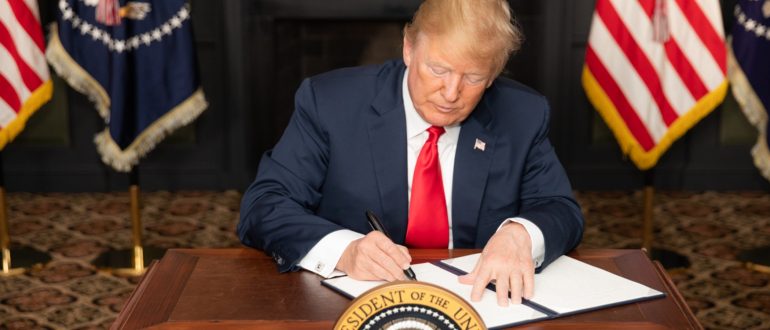
Sanctions and Critical Mass: How Thomas Schelling’s models lay out the future of unilateral U.S. Sanctions
“Trump threatens Iraq with sanctions if U.S. troops are expelled”.
“Bolton threatens ICC with sanctions if Afghanistan war crimes investigated”.
“US envoy defends Nord Stream 2 sanctions as ‘pro-European’”.
Unilateral sanctions against any entity challenging American interests have become a hallmark of U.S. foreign policy over the last decade. The effectiveness or “bite” of these sanctions rests on the dominance of the dollar as the world’s trade finance currency, and so far U.S. unilateral sanctions have been effective at compelling nearly all neutral states to comply, due to the lack of a viable and mature trade finance alternative and threat of secondary sanctions.
This naturally begs the question: Is there an unlimited arsenal of sanctions which will always allow the U.S. to force compliance and advance its interests unabatedly, or what (if anything) would limit the U.S.’s ability to sanction at will and prevent non-compliance?
The answer lies in the models devised in the 1960s by economist Thomas Schelling. For brevity’s sake, let’s focus on Iran sanctions as a prime example. The origin of Trump’s “maximum pressure” campaign against Iran is Schelling’s compellence model, a form of calibrated brinksmanship in which a series of escalating constrictions on the adversary must keep reducing the payoffs for non-compliance with each measure, and the forcing party can’t back down. To implement compellence, U.S. sanctions have been increasing in scope since President Trump pulled the U.S. out of JCPOA in 2018. Starting with Iran’s oil exports, U.S. unilateral sanctions have expanded to include its metals, refining, and shipping industries, its foreign minister and senior leaders, and its Central Bank as a whole, restricting nearly all access to external financing for the Iranian economy. More recently, after the assassination of General Soleimani threatened to turn U.S. and Iran’s proxy war into a direct “hot” war and after Iran’s prior-warned de-escalating retaliatory strikes, the U.S. sanctioned nearly all sectors of Iran’s economy which weren’t included in prior sanctions.
The U.S.’s compellence strategy and sanctions against Iran have been extremely effective and acted as a successful deterrent to trade with Iran thus far. Though the remaining parties to the JCPOA vowed to keep the deal alive and offer Iran alternative financing mechanisms to mitigate the detrimental effects of U.S. unilateral sanctions, so far, no country has been successfully able to bypass the sanctions. Europe has dabbled between strong rhetoric, in-principle blocking of unilateral sanctions, and conceptualizing a special purpose vehicle INSTEX, to facilitate trade with Iran, given the primary international settlement vehicle SWIFT disassociated with Iran shortly after U.S. sanctions were announced. However, to this day, none of these mechanisms have been effectively operationalized to a working extent.
To understand why, it is necessary to frame sanctions compliance as a multi-player prisoner’s dilemma, in which Schelling’s critical mass model between compliance and defiance can be applied. Each country in this game has a payoff which is dependent on a threshold of whether other countries choose to comply or defy. So far, for the EU, the dominant strategy has been to comply. This is because, for European companies, the payoff of non-compliance with U.S. sanctions and participating in trade with Iran while losing dollar-based financing has so far been significantly lower than the payoff of sacrificing Iran business and maintaining the far larger volume of U.S. business. Beyond American and European companies, even Indian and Russian companies have calculated the risk of losing access to western financing, in addition to the risk of losing U.S. business, to not be worth the tradeoff gained in trading with Iran. The U.S. has furthermore threatened to sanction any company which participates in INSTEX, explicitly lowering the payoffs to participate.
Will this altered payoff remain the case for the foreseeable future, or is there a viable avenue for non-compliance with ever-expanding U.S. unilateral sanctions?
In a multi-player’s prisoner’s dilemma, just as in a two-player prisoner’s dilemma, there is a superior outcome of higher payoffs for players if they collude and decide to not comply together. This can only be achieved if there’s a critical mass of colluding players (countries or companies in this case) which choose not to comply. This achieves payoff parity with compliance based on the sheer number of players in the colluding coalition.
So far, the U.S. has been able to prevent this colluding coalition from forming by threats of secondary sanctions as well as escalating trade tariffs, which served as a backdrop to the JCPOA E3 (France, Germany, and the U.K.) countries’ decision to trigger the JCPOA dispute mechanism despite their initial reluctance. But the question remains if the U.S. can perpetually prevent a coalition of critical mass states which are unperturbed by U.S. threats from forming eventually.
There is certainly a momentum of increasing states wishing to trade with Iran despite the threat of U.S. sanctions, with 6 new European countries becoming INSTEX shareholders. However, with INSTEX still not operating due to fear of secondary U.S. sanctions, this additional boost is not a significant enough threshold for a minimum critical mass.Instead, any push will likely come from Asia. Iran’s preferential customs-free trade agreement with the Russian-led Eurasian Economic Union has been operationalized last year, which is facilitating payments that bypass U.S. financial reach by using Russia’s and Iran’s home-grown alternatives to SWIFT. China not only continues to import Iranian crude despite U.S. sanctions waivers expiring, but has also made Iran an essential hub in its Belt and Road Trade Initiative, with plans to invest $400 billion into Iranian energy and transport infrastructure facilitating wider trade with partners across Eurasia. BRICS countries, which account for 30% of Iran’s non-oil trade (16), have pushed for global trade de-dollarization efforts, alarming U.S. grand strategists.
It remains to be seen how resilient these coalitions will emerge against U.S. sanctions pressure, as for example India’s much touted plans to develop Iran’s Chabahar port have faltered in the midst of sanctions risks despite being granted an explicit waiver. However, the increasing number of countries that are part of one of these coalitions are also six out of the top 10 U.S. trading partners. Additionally, sanctions are having a blowback into supply chains feeding critical portions of the U.S. economy, as was the case when the U.S. sanctioned large Russian parastatal commodity enterprises in 2018. As more countries join coalitions to continue trade with sanctioned entities, eventually a point is being reached where the ripple effect consequences for sanctions will damage the U.S. economy to an extent which outweighs any marginal benefit, as was the case when the proposed “sanctions bill from hell” against Russian sovereign wealth and financial giants was met with hesitation and reluctancy. As the reach of sanctions increases, such cases point to the leverage that large entities enjoy against sanctions due to integrated supply chains and investment flows.
Similarly, the expanding list of entities and countries which are being subjected to expanding sanctions is also reaching a point where compliance with sanctions will hurt their own economic interests more than help it, altering the payoffs in a multi-player prisoner’s dilemma game. This is the impetus behind the increasing number of states with an incentive to de-dollarize, and is the catalyst in forming the critical mass coalition which will eventually be able to refuse to comply with sanctions despite the risks of losing U.S. business and secondary sanctions. At the rate at which sanctions are expanding, it is only a matter of time before sanctions are expanded to activity which will naturally encompass a large portion of the U.S.’s foreign trade portfolios, and implementing sanctions will hurt the U.S. economy further. At this point, the collective bargaining power of the entities subjected to U.S. sanctions will exceed the leverage that the U.S.’s financial hegemony has relied upon til date. This will be the “tipping point” in the U.S.’s ability to enforce sanctions, with a critical mass economic coalition preventing their effectiveness.
U.S. policymakers have to take this reality into consideration in forming sanctions policy. The same economic author of the model behind maximum pressure also authored the model behind its constraints.
References
“Trump threatens Iraq with sanctions if US troops are expelled” BBC World News. January 6, 2020. https://www.bbc.com/news/world-middle-east-51003159
“John Bolton threatens ICC with US sanctions” BBC World News. September 11, 2018. https://www.bbc.com/news/world-us-canada-45474864
Chazan, Guy. “US envoy defends Nord Stream 2 sanctions as ‘pro-European’” Financial Times. December 22, 2019. https://www.ft.com/content/21535ebe-23dc-11ea-9a4f-963f0ec7e134
“The “Maximum Pressure” Policy is the Illegitimate Child of Diplomacy” Lobe Log. September 24, 2019. https://lobelog.com/the-maximum-pressure-policy-is-the-bastard-child-of-diplomacy/
“Iran Sanctions” U.S. State Dept. 2020. https://www.state.gov/iran-sanctions/
Borak, Donna et. al. “US imposes new sanctions on Iran” CNN. January 10, 2020. https://www.cnn.com/2020/01/10/politics/us-sanctions-iran-mnuchin/index.html
Dowling, Siobhan. “INSTEX: Doubts linger over Europe’s Iran sanctions workaround” Al Jazeera. July 1, 2019. https://www.aljazeera.com/ajimpact/instex-doubts-linger-europe-iran-sanctions-workaround-190701095202660.html
Wald, Ellen. “10 Companies Leaving Iran As Trump’s Sanctions Close In” Forbes. Jun 6, 2018. https://www.forbes.com/sites/ellenrwald/2018/06/06/10-companies-leaving-iran-as-trumps-sanctions-close-in/#9541afec90ff
Stearns, Jonathan et. al. “U.S. Warns Europe That Its Iran Workaround Could Face Sanctions” Bloomberg News. May 29, 2019. https://www.bloomberg.com/news/articles/2019-05-29/u-s-warns-europe-that-its-iran-workaround-could-face-sanctions
Hudson, John et. al. “Days before Europeans warned Iran of nuclear deal violations, Trump secretly threatened to impose 25% tariff on European autos if they didn’t” Washington Post. Jan. 15, 2020. https://www.washingtonpost.com/world/national-security/days-before-europeans-warned-iran-of-nuclear-deal-violations-trump-secretly-threatened-to-impose-25percent-tariff-on-european-autos-if-they-didnt/2020/01/15/0a3ea8ce-37a9-11ea-a01d-b7cc8ec1a85d_story.html
“Six more countries join Trump-busting Iran barter group” Guardian. Nov 30, 2019. https://www.theguardian.com/world/2019/dec/01/six-more-countries-join-trump-busting-iran-barter-group.
Brzozowski, Alexandra. “INSTEX fails to support EU-Iran trade as nuclear accord falters” EURACTIV. Jan 14, 2020 https://www.euractiv.com/section/global-europe/news/instex-fails-to-support-eu-iran-trade-as-nuclear-accord-falters/
“Iran Trades $430m With Eurasian Economic Union at Preferential Tariff Rates” Financial Tribune. December 29, 2019. https://financialtribune.com/articles/domestic-economy/101446/iran-trades-430m-with-eurasian-economic-union-at-preferential
“Banks in Iran, Russia Connected via Non-SWIFT Financial Messaging Service” Financial Tribune. September 17, 2019. https://financialtribune.com/articles/business-and-markets/99912/banks-in-iran-russia-connected-via-non-swift-financial-messaging
“China to Invest $400 bn in Iran’s Energy, Transport Sectors” Belt and Road News. Sep. 7, 2019. https://www.beltandroad.news/2019/09/07/china-to-invest-400-bn-in-irans-energy-transport-sectors/
“BRICS Accounts for 30% of Iranian Non-Oil Trade” Financial Tribune. April 21, 2019. https://financialtribune.com/articles/domestic-economy/97526/brics-accounts-for-30-of-iranian-non-oil-trade
Luft, Gal. “The anti-dollar awakening could be ruder and sooner than most economists predict”
Aug 27, 2018. https://www.cnbc.com/2018/08/27/the-anti-dollar-awakening-could-be-ruder-and-sooner-than-most-economists-predict.html
Kutty, Sumitha. “India’s Iran Port Plans Languish Despite US Waiver” Bourse and Bazaar. August 28, 2019. https://www.bourseandbazaar.com/articles/2019/8/28/indias-iran-port-plans-languish-despite-us-exemption
“Foreign Trade: Top Trading Partners” U.S. Census Bureau. December 2019. https://www.census.gov/foreign-trade/statistics/highlights/top/index.html
Whalen, Jeanne. “Too big to sanction? U.S. struggles with punishing large Russian businesses.” Washington Post. August 26, 2018. https://www.washingtonpost.com/business/economy/too-big-to-sanction-us-struggles-with-punishing-large-russian-businesses/2018/08/26/c797e294-9fd6-11e8-8e87-c869fe70a721_story.html
Prince, Todd. “U.S. Lawmakers Pass Russia ‘Sanctions Bill From Hell’” Radio Free Europe / Radio Liberty. December 18. 2019. https://www.rferl.org/a/u-s-lawmakers-to-discuss-russia-sanctions-bill-from-hell-/30331992.html
Huang, Eustance. “A ‘growing club’ of ‘very powerful countries’ is steering away from using the dollar” CNBC. Oct 30, 2019. https://www.cnbc.com/2019/10/31/de-dollarization-russia-china-eu-are-motivated-to-shift-from-using-usd.html
Rappeport, Alan. et. al. “Trump’s Embrace of Sanctions Irks Allies and Prompts Efforts to Evade Measures” NY Times. Nov. 15, 2019. https://www.nytimes.com/2019/11/15/us/politics/trump-iran-sanctions.html

Parv Aggarwal
Parv Aggarwal has a strategic expansion and business development background in the energy, financial inclusion, and FDI (Foreign Direct Investment) domains, and is combining his experiences to pursue multi-pronged economic resilience strategy analysis in Eurasia. Prior to Fletcher, Parv led business development projects in both traditional grid supply chain and renewable product development in both corporate and startup settings, and helped an inclusive credit union open new branches via geospatial analytics. At Fletcher, Parv is shifting focus from micro financial inclusion strategy to macro financial risk analysis, with a focus on Russia and CIS countries. He hopes to combine his past experiences, internships at the Central Bank of Armenia, FDI Analytics, International Economic Alliance, HSE Moscow exchange semester, and master's research on sanctions to pursue economic resiliency strategy in Eurasia.
